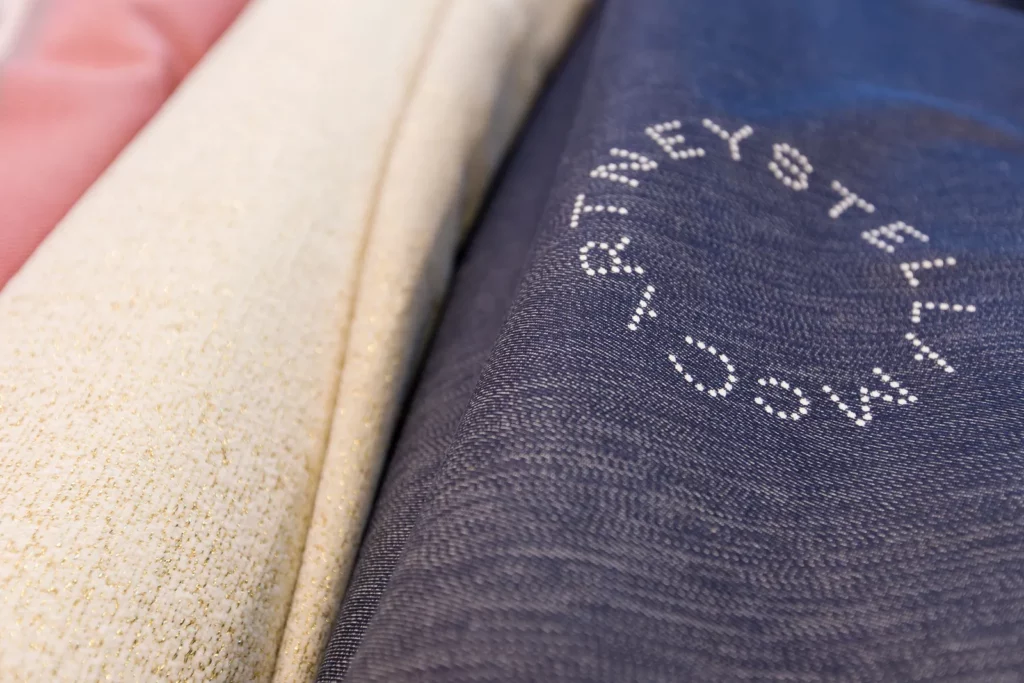In a partnership with Protein Evolution, Inc., British designer Stella McCartney will turn previous collections into new products through a novel textile recycling process.
Polyester and nylon fabrics have been the bane of the sustainable fashion world for years. The materials are derived from petroleum, just like plastic, making them a key driver of climate change. Emissions from fossil fuels are the leading cause of global warming, responsible for more than 35 percent of global emissions.
While numbers are hard to pinpoint, best estimates put the fashion industry at two to ten percent of total global greenhouse gas emissions.
Some companies have turned to upcycling deadstock, such as Los Angeles-based Reformation, which uses upcycled nylon in its collections. Prada has made its Re-Nylon a focus of its sustainability targets. LVMH’s Nona Source and Italian luxury label Valentino have both put an emphasis on deadstock recently.

But nylon and polyester’s problems don’t end in upcycling. The pervasive plastic-based materials are the leading cause of microfibers entering oceans and waterways, endangering wildlife, and contributing to climate change by disrupting ocean pH levels. The more acidic the oceans become, the less capable they are of sequestering carbon — one of the oceans’ most important functions.
Textiles produce 35 percent of the ocean-bound microplastic pollution; millions of microfibers are shed for every load of laundry, experts warn.
Up-and-coming tech brand Protein Evolution, backed by British designer Stella McCartney, says it has a circular solution for the fashion industry that’s specifically aimed at plastic-based materials like nylon and polyester.
We must act today to protect our planet for tomorrow, and circular and regenerative solutions offer an optimistic look at the future of fashion.
-Stella McCartney
It’s kicking off with Stella McCartney in tow; beginning next year, leftover materials from McCartney’s collections will be transformed into new materials that can be reused repeatedly.
McCartney has long been an advocate for sustainable fashion, pioneering vegan leather, including her recent launch of a mycelium leather bag in partnership with Bolt Threads, as well as continuing to increase her use of sustainable materials like Tencel.
But that doesn’t fix the end-of-life problem for textiles. “The horrific amount of fast fashion produced that then goes to landfill is truly shocking, both from the natural resources used to the sheer quantity wasted,” McCartney said. “We must act today to protect our planet for tomorrow, and circular and regenerative solutions offer an optimistic look at the future of fashion.”
Scott Stankey, Protein Evolution’s co-founder and chief technology officer, says Protein Evolution’s proprietary biological recycling process has the power to enable circularity efforts across the textile industry. “By partnering with Stella McCartney, we are able to test our platform in a real-world setting and collectively learn how to seamlessly integrate PEI’s technology into existing manufacturing processes,” Stankey said in a statement.

According to Stankey, the collaboration with McCartney will demonstrate for the first time how complex fabric types, such as nylon and polyester blends, can be fully re-used to make new plastic material in a low-energy, cost-effective way. The company’s first product is an enzymatic process that allows textile and plastic waste to be reused indefinitely.
Connor Lynn, PEI co-founder and chief business officer says the Stella McCartney brand is synonymous with sustainability, circularity, and innovation. “Together we’re setting out to accomplish something that’s never been done at an industrial scale before, and we’re just getting started.”
McCartney was an early investor in Protein Evolution. The company’s initial fundraising round was led by Collaborative Fund’s climate-focused Collab SOS, which is in partnership with McCartney. The $200 million fund is targeting companies that are developing sustainable materials, ingredients, energy, and supply chains.
Protein Evolution is a prime example, McCartney says. She’s hopeful the partnership will pioneer a new type of polyester from old materials and find other solutions to help the fashion industry become more sustainable. “Establishing climate goals is one thing, taking meaningful steps toward a more sustainable future is what truly matters.”
Related on Ethos:


